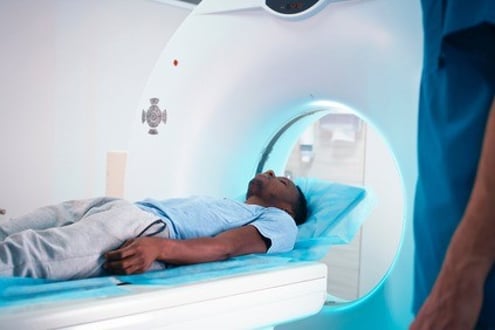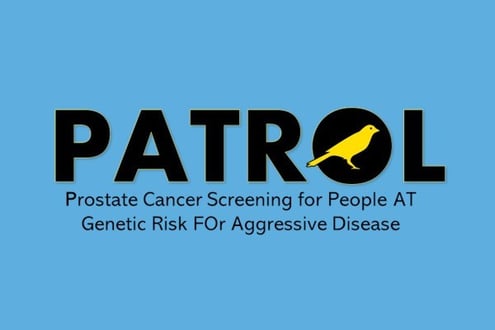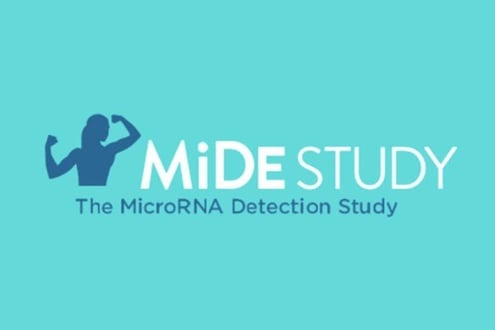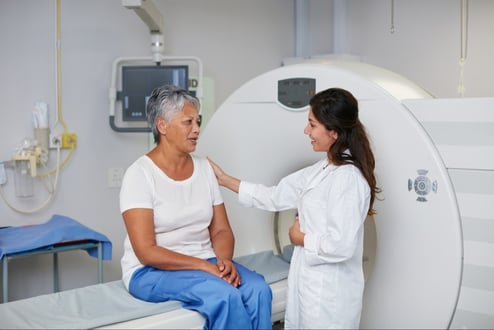BRCA1: Options for Managing Risk
Risk Management for People with Inherited Mutations
People with mutations have options for managing their increased cancer risk. Experts at the National Comprehensive Cancer Network (NCCN) created guidelines for people with a mutation to manage their cancer risk.
We recommend that you speak with a genetics expert who can look at your personal and family history of cancer and can help you decide on a plan for managing your risk.
NCCN recommends that all people with an inherited mutation receive education on the signs and symptoms of BRCA1-related cancers. NCCN guidelines for specific cancers are listed below.
People with a mutation may also qualify for clinical trials looking for more effective screening or prevention for cancer.
|
Beginning Age |
Recommendation |
Additional Information |
|
No set age |
Learn to be aware of changes in your breasts. |
Self exams may be most informative at the end of the menstrual cycle. |
|
25 (or earlier based on youngest age of breast cancer in the family) |
Breast exam by doctor (also known as a clinical breast exam) every 6-12 months. |
The guidelines recommend that people who have risk-reducing mastectomy continue to receive clinical breast exams. |
|
25 (or earlier based on youngest age of breast cancer in the family) |
Yearly breast with and without contrast beginning at age 25 and continuing until age 75. |
If is not available, screening should begin at age 25. |
|
30 |
Yearly . |
|
|
No set age |
Have a discussion with your doctor about the benefits, risks and costs of double mastectomy. |
Risk-reducing mastectomy lowers breast cancer risk by 90%, but has not been shown to improve survival. Even after double mastectomy, some breast tissue, and therefore cancer risk remains. The guidelines recommend continuing clinical breast exam after risk-reducing mastectomy. |
|
No set age |
Have a discussion with your doctor about the benefits, risks and costs of medications to lower the risk for breast cancer. |
Tamoxifen or other estrogen-blocking drugs may lower breast cancer risk. Medications or vaccines are being studied in clinical trials. |
|
75 |
Have a discussion with your doctor about whether to continue, stop or change breast screening. |
|
|
Source: NCCN Guidelines: Genetic/Familial High-Risk Assessment: Breast, Ovarian, Pancreatic, , v. 3 2026. |
||
|
Beginning Age |
Recommendation |
|
35 |
Learn how to do a breast self-exam and be aware of changes in your breasts. |
|
35 |
Breast exam by doctor every 12 months. |
|
50 (or earlier based on the youngest case of male breast cancer in the family) |
Have a discussion with your doctor about the benefits, risks and costs of annual . |
|
Source: NCCN Guidelines: Genetic/Familial High-Risk Assessment: Breast, Ovarian, Pancreatic, , v. 3, 2026. |
|
|
Beginning Age |
Recommendation |
Additional Information |
|
35-40 |
Risk-reducing removal of ovaries and (). Timing of surgery should take into account plans to have children. |
|
|
35-40 |
Have a discussion with your doctor about the risks, benefits and costs of removing your uterus (hysterectomy) at the time of . |
The following factors may affect your decision about hysterectomy at the time of RRSO:
|
|
Before age 50 |
Experts believe that most ovarian cancers begin in the . Researchers are studying whether the removal of the only () and delaying until closer to the age of natural menopause is a safe option for lowering risk in people who are not ready to remove their ovaries. Guidelines recommend that people interested in this approach speak with their doctor about the benefits and risks, and consider enrolling in a research study. |
|
|
No set age |
Speak with your doctor about the benefits, risks and timing of oral contraceptives or intrauterine devices (IUD) to lower the risk for ovarian and cancers. |
|
|
No set age |
Become aware of ovarian and primary peritoneal cancer symptoms. Report any symptoms that persist for several weeks and are a change from normal to your doctor. Routine ovarian cancer screening using transvaginal and a blood test has not shown benefit and is not recommended. |
Symptoms of ovarian cancer include:
|
|
Source: NCCN Guidelines: Genetic/Familial High-Risk Assessment: Breast, Ovarian, Pancreatic, , v. 3, 2026. |
||
|
Beginning Age |
Recommendation |
|
40 |
|
|
50 (or earlier based on the youngest case of cancer in the family) |
|
|
Source: NCCN Guidelines: Genetic/Familial High-Risk Assessment: Breast, Ovarian, Pancreatic, , vs. 3, 2026. |
|
Risk management for pancreatic cancer
There are two tests that are used to look for pancreatic cancer in high-risk people.
- MRCP (Contrast-enhanced magnetic resonance cholangiopancreatography) is a special type of imaging that looks closely at the pancreas, liver, gallbladder, bile duct and pancreatic duct to find abnormalities such as cancer.
- EUS (Endoscopic ) involves passing a tiny scope with an attached probe down the esophagus to the stomach. This allows doctors to look closely at the pancreas.
There are two separate organizations with guidelines related to screening for pancreatic cancer in people with mutations, the American Society of Gastrointestinal Endoscopy (ASGE) and the National Comprehensive Cancer Network (NCCN). The guidelines differ on who should receive screening based on gene mutation and family history.
|
Organization |
Beginning Age |
Family History |
Recommendation |
|
ASGE |
50 (or earlier based on the youngest case of pancreatic cancer in the family) |
For mutation carriers regardless of family history of pancreatic cancer |
Annual screening for pancreatic cancer with MRI/MRCP or EUS |
|
NCCN |
50 (or earlier based on the youngest case of pancreatic cancer in the family) |
For mutation carriers with a first- or second- degree relative with pancreatic cancer |
|
|
Source: NCCN Guidelines: Genetic/Familial High-Risk Assessment: Breast, Ovarian, Pancreatic, , v. 3, 2026; ASGE guideline on screening for pancreatic cancer in individuals with genetic susceptibility: summary and recommendations. Gastrointest Endosc. 2022 May;95(5):817-826. |
|||
Other cancers
Melanoma
NCCN does not include guidelines for melanoma screening for people with mutations. However, some experts recommend general melanoma risk management such as a yearly full-body skin exam, a yearly eye exam and avoiding too much sun exposure.
Other cancer screening and prevention
There isn’t enough research to show that people with a mutation benefit from extra screening or prevention for other types of cancer. Because of this, experts recommend following general population screening guidelines and considering your family history when managing these risks. National guidelines exist for screening the following cancers:
More Resources
Participate in Prevention Research
Below are some of our featured research studies looking at new ways to screen for, prevent or intercept cancer in people with mutations. To search for additional studies, visit our Search and Enroll Tool.
Vaccine for People at High Risk for Pancreatic Cancer
Clinicaltrials.gov identifier: NCT05013216
Using a Shorter Type of MRI as a Screening Tool for People at High Risk for Prostate Cancer
Clinicaltrials.gov identifier: NCT05384535
Screening Study for Pancreatic Cancer in People with Inherited Mutations
Clinicaltrials.gov identifier: NCT05058846
PATROL Study: Prostate Cancer Screening for People AT Genetic Risk FOr Aggressive Disease
Clinicaltrials.gov identifier: NCT04472338
Screening Study for Men at High Genetic Risk for Prostate Cancer
Clinicaltrials.gov identifier: NCT03805919
In the News
After breast cancer, people who have a BRCA1 or BRCA2 mutation face a greater risk...
Study : Study: Endometrial cancer risk for people with BRCA1 and BRCA2 mutations
This study looked at how often endometrial cancer occurred in people with BRCA1 or BRCA2...
Study : Risk of peritoneal cancer is low for people with an inherited BRCA mutation after surgery
The risk of peritoneal cancer is low in people with an inherited BRCA1 or BRCA2...
Update : A breast cancer vaccine for people with an inherited BRCA1, BRCA2 or PALB2 mutation
A breast cancer vaccine is showing promise in early clinical trials. Initially, the vaccine was...















